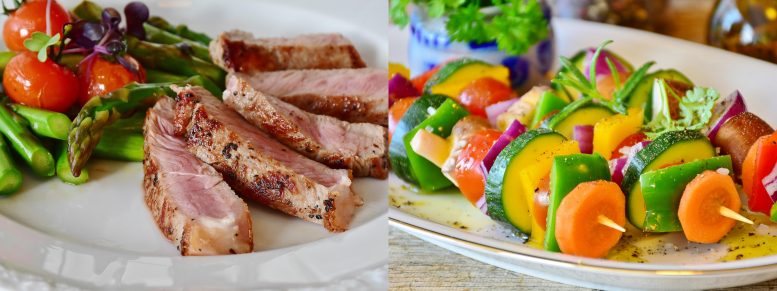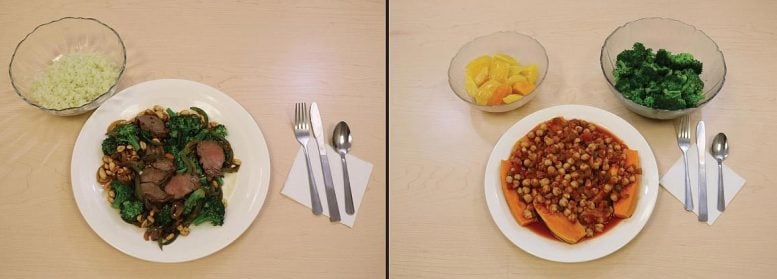
Research indicates that the causes of overeating and weight gain are more intricate than simply the quantity of carbs or fat in one’s diet.
People on a low-fat, plant-based diet ate fewer daily calories but had higher insulin and blood glucose levels, compared to when they ate a low-carbohydrate, animal-based diet, according to a small but highly controlled study at the National Institutes of Health. Led by researchers at the National Institute of Diabetes and Digestive and Kidney Diseases (NIDDK), the study compared the effects of the two diets on calorie intake, hormone levels, body weight, and more. The findings, published today (January 21, 2021) in Nature Medicine, broaden understanding of how restricting dietary carbohydrates or fats may impact health.
“High-fat foods have been thought to result in excess calorie intake because they have many calories per bite. Alternatively, high-carb foods can cause large swings in blood glucose and insulin that may increase hunger and lead to overeating,” said NIDDK Senior Investigator Kevin Hall, Ph.D., the study’s lead author. “Our study was designed to determine whether high-carb or high-fat diets result in greater calorie intake.”
The researchers housed 20 adults without diabetes for four continuous weeks in the NIH Clinical Center’s Metabolic Clinical Research Unit. The participants, 11 men and nine women, received either a plant-based, low-fat diet or an animal-based, low-carbohydrate diet for two weeks, immediately followed by two weeks on the alternate diet. The low-fat diet was high in carbohydrates. The low-carbohydrate diet was high in fats. Both diets were minimally processed and had equivalent amounts of non-starchy vegetables. The participants were given three meals a day, plus snacks, and could eat as much as desired.

Examples of dinners given to study participants: low-carb, animal-based diet (left) and low-fat, plant-based diet (right). Credit: Amber Courville and Paule Joseph, NIH
The main results showed that people on the low-fat diet ate 550 to 700 fewer calories per day than when they ate the low-carb diet. Despite the large differences in calorie intake, participants reported no differences in hunger, enjoyment of meals, or fullness between the two diets. Participants lost weight on both diets, but only the low-fat diet led to a significant loss of body fat.
“Despite eating food with an abundance of high glycemic carbohydrates that resulted in pronounced swings in blood glucose and insulin, people eating the plant-based, low-fat diet showed a significant reduction in calorie intake and loss of body fat, which challenges the idea that high-carb diets per se lead people to overeat. On the other hand, the animal-based, low-carb diet did not result in weight gain despite being high in fat,” said Hall.
These findings suggest that the factors that result in overeating and weight gain are more complex than the amount of carbs or fat in one’s diet. For example, Hall’s laboratory showed in 2019 that a diet high in ultra-processed food led to overeating and weight gain in comparison to a minimally processed diet matched for carbs and fat.
The plant-based, low-fat diet contained 10.3% fat and 75.2% carbohydrate, while the animal-based, low-carb diet was 10% carbohydrate and 75.8% fat. Both diets contained about 14% protein and were matched for total calories presented to the subjects, although the low-carb diet had twice as many calories per gram of food than the low-fat diet. On the low-fat menu, dinner might consist of a baked sweet potato, chickpeas, broccoli and oranges, while a low-carb dinner might be beef stir fry with cauliflower rice. Subjects could eat what and however much they chose of the meals they were given.
“Interestingly, our findings suggest benefits to both diets, at least in the short-term. While the low-fat, plant-based diet helps curb appetite, the animal-based, low-carb diet resulted in lower and more steady insulin and glucose levels,” Hall said. “We don’t yet know if these differences would be sustained over the long term.”
The researchers note that the study was not designed to make diet recommendations for weight loss, and results may have been different if participants were actively trying to lose weight. Further, all meals were prepared and provided for participants in an inpatient setting, which may make results difficult to repeat outside the lab, where factors such as food costs, food availability, and meal preparation constraints can make adherence to diets challenging. The tightly controlled clinical environment, however, ensured objective measurement of food intake and accuracy of data.
“To help us achieve good nutrition, rigorous science is critical − and of particular importance now, in light of the COVID-19 pandemic, as we aim to identify strategies to help us stay healthy,” said NIDDK Director Griffin P. Rodgers, M.D. “This study brings us closer to answering long-sought questions about how what we eat affects our health.”
Reference: “Effect of a plant-based, low-fat diet versus an animal-based, ketogenic diet on ad libitum energy intake” by Kevin D. Hall, Juen Guo, Amber B. Courville, James Boring, Robert Brychta, Kong Y. Chen, Valerie Darcey, Ciaran G. Forde, Ahmed M. Gharib, Isabelle Gallagher, Rebecca Howard, Paule V. Joseph, Lauren Milley, Ronald Ouwerkerk, Klaudia Raisinger, Irene Rozga, Alex Schick, Michael Stagliano, Stephan Torres, Mary Walter, Peter Walter, Shanna Yang and Stephanie T. Chung, 21 January 2021, Nature Medicine.
DOI: 10.1038/s41591-020-01209-1
The research was supported by the NIDDK Intramural Research Program. Additional NIH support came from the National Institute of Nursing Research under grant 1Z1ANR000035-01.








meaningless study – N too small and time on each diet was too brief to make any conclusions
Maybe the study should include high fat plant based diet. One that included health fats from ,nuts & seeds.Avocados be for disowning the benefits to a whole food plant based diets.
2 weeks on a diet and then switching to the other side is a very short time window also at being 10% carbs the low carb diet is still too carb heavy to allow the body to go into a ketogenic state which really helps burn fat.
Exactly…Keto or go home. Weight loss is hormonal and you’re activating insulin with 10% carbs just as with the low fat diet. Even if the low carbers were eating 1500 calories, that’s 150g carbs. Yikes!
I am sorry but your math is incorrect. 10 percent of 1500 calories is 150. Which means 150 calories of the diet is from Carbohydrates. It does not mean that 150 grams of carbs is consumed on this diet. Since there are 4 calories per gram of carbohydrate, you would have 37.5 grams of carbs if 10 percent of the diet was carbs in a 1500 calorie diet
Two weeks is too short to properly evaluate a diet. But there are other studies that looked at longer time frames:
https://www.ncbi.nlm.nih.gov/pmc/articles/PMC2716748/
Two weeks is too short a study. And getting 75% of your diet from fat will give you other health issues over a period of time. Example: clogged arteries, weight gain, high blood pressure, etc. It’s shameful they even produced this study. These doctors know better.
That is not correct.
The opposite is actually the case. A high fat diet does not clog arteries and results in lower blood pressure.
How about a high fat low carb mostly plant based diet. Seems the best of both worlds.
Most people who eat a high fat diet, consciously, eschew grain fed animal products and also do intermittent fasting. They don’t eat three meals a day plus snacks, they eat one or two. How can you measure the level of consciousness people are bringing to food with bloodwork statistics? You can measure some things, but they may not be the most important things for the health of the individual. All you will get is statistics over a population, and be reduced to putting the real risk in the fine print and the relative risk in the headlines.
No one does a low-carb diet this way. Instead, you will need to get into ketosis — quickest way is a 24-hour dry fast (no water), followed by 48 hour water fast (with water). Then try intermittent fasting or one meal a day. The only limit to your weight loss is how many skinny jeans you can afford.
Not enough time to learn anything.
Did they measure energy levels and the effects of the diets on strength or muscle mass?
“We don’t yet know if these differences would be sustained over the long term.”
I have read that Vietnam War American POWs took time for their metabolism to adjust to their rice diet and obtain the maximum nutritional value from the rice. As others have suggested, two weeks may not be adequate time to draw valid conclusions from the study.
This may have been a “highly controlled study,” but I question the quality of the design!
It takes at least two weeks for your microbiome to adjust to a major diet change. This study is meaningless.
Studies like that belong to the 90s. These days we know very well that fat is very good for us, but not all fats are created equal. Animal fats are superior, followed closely by MCT and some plant fats like Avocado and Olive oils. Other plant based fats like sunflower and rapeseed oils are actually quite inflammatory on the body.
The ideal diet shouldnt have words like low or high in it, but balanced. A focus on plants, and good fats with grass fed organic animal meats being essential and any non processed carbs, like sweet potatoes, rice and pulses being great complements. Nature gives us pretty much all we need to live a long and healthy life with plenty of energy reserves and enough calorific intake to keep us from entering the starvation mode that our fight or flight conscious dislikes.
Avoiding processed sugars and flours, ideally avoiding sugars and wheat altogether is what will stabilise insulin and I would know because I have a family history with diabetes and only when applying the lifestyle I mention here is the blood sugar not only just under control but also the entire body is in an anti-inflammatory state.
I eat ethically ..i am not a graveyard
I assume fibre was higher on the low fat diet? When someone switches from a diet with processed food to one of whole foods the fullness feeling of fibre will reduce their calories. This is temporary, I expect by the end of 2 weeks the raised ghrelin and gut adaption would mean calories increasing daily to reach satiation.
Such a poor study. To become fat adapted takes more than two weeks. People running this seemed to know next to nothing about the low carbon, high fat way of eating. Such a small number of people taking part and for such a short time tells us nothing.
Flawed! In an imperfect world no one is preparing all your meals for you and you have access to fast food/and other unhealthy choices.
Cue the Keto religion comments.
I still Keto intermittently to drop weight quickly, then maintain using IF. This is working at age 50 just fine. My IF diet is simply… varied but weighted against carbs, high protein and quality carbs. No fear of saturated fats but quality omega 3s are welcome. I occasionally fall off the wagon, but never long enough to start increasing weight. Walking and light weights for exercise. I feel good. BMI of 25 and going down.